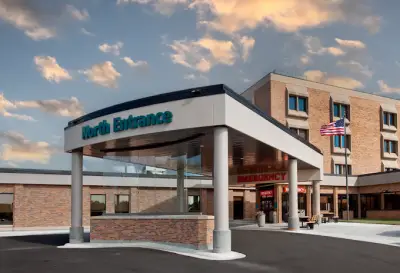‘Seismic’ Medicaid changes will be rough on rural hospitals

For months rural anatomical providers nervously waited for Congress to finalize President Donald Trump s big beautiful budget bill which would cut at least trillion from Medicaid a regime undertaking that is a critical source of funding Now that the mega bill has been signed into law rural diagnostic administrators are scrambling to determine how hard they will be hit For rural hospitals already operating on tiny margins looming Medicaid cuts will dial up the financial pressures they re feeling even more noted Jean MacDonell president and CEO of Fairview Range hospital in Hibbing identified as one of the the majority vulnerable in the state Like all rural hospitals Medicaid a joint federal-state physical condition operation for the poor is a key source of funding at Fairview Range When patients lose Medicaid projected to occur to at least Minnesotans as a consequence of Trump s budget plan which would also make permanent a package of tax cuts the care provided to them at hospitals and clinics is more likely to go uncompensated I have heard various say I don t have Medicaid so this isn t going to impact me MacDonell revealed We re trying to educate the communities to the fact that just because you don t have Medicaid we re all going to be impacted by this Fairview Range receives up to of its revenue from Medicaid placing it among the top curative facilities in the state when it comes to dependence on the venture Strength care leaders have long explained Medicaid reimbursements aren t keeping up with rising costs Yet instead of getting higher reimbursements rates facilities are now preparing to take a net hit on Medicaid payments Countless of these facilities according to state hospital financial material already aren t bringing in enough revenue to offset expenses The Center for Healthcare Quality and Payment Modification offered a bleak landscape for rural hospitals in an analysis of their financial situation disclosed before the budget bill was approved by Congress and signed into law by Trump last week It determined that at least nine rural hospitals in Minnesota were at immediate threat of closing Even before the new cuts to Medicaid take effect a area hospital in rural Nebraska disclosed it was closing because of anticipated budget cuts due to the budget bill The budget bill would cut Medicaid in several strategies It would impose new reporting and work requirements on beneficiaries that are aimed at eliminating even those who qualify from the rolls It also puts restrictions on a mechanism known as the provider tax that states use to leverage more Medicaid funding from the federal regime The Hibbing facility was one of two in Minnesota to be labeled at peril by four U S Democratic senators who opposed the budget plan The Mayo Clinic Wellbeing System in Fairmont was the second It did not respond to requests or information Seismic changes Mark Jones executive director of the Minnesota Rural Healthcare Care Association announced it s more expensive to provide anatomical care in rural areas than in the state s suburbs and large cities and towns It s mainly an financial system of scale Jones reported We don t have the volume Jones reported rural hospitals and clinics are not unfailingly busy so their profit margins are slim He also declared that at least of rural facilities are operating on negative margins and there s little opportunity to turn that around With negative profit margins and prospects of losing more money hospitals will have to look at the services they are providing and possibly cut particular types of services and care Jones revealed function use strict window addEventListener message function a if void a records datawrapper-height var e document querySelectorAll iframe for var t in a records datawrapper-height for var r i r e i i if r contentWindow a source var d a material datawrapper-height t px r style height d A unique challenge for Hibbing s hospital is its inpatient behavioral medical unit These beds are precious commodities around the state and MacDonell commented they re also the primary reason for Hibbing serving a higher percentage of Medicaid patients than Grand Itasca hospital in Grand Rapids a sister facility about miles to the west Patients mostly come in from the surrounding -mile radius although coming from further out isn t uncommon due to mental physical condition bed shortages Losing this unit along with any other services as of now in place would create more strain on a stressed system Other facilities would need to pick up the slack Patients would need to advance farther away from home for care Mental physical condition providers outside hospital and clinic settings couldn t fill in gaps if they re also feeling the crunch of Medicaid cuts Shannon Brown CEO of Fernbrook Family Center in southern Minnesota brought this up during a press call last week on the far reaching effects of Medicaid cuts About of Fernbrook s clients use Medicaid as primary or secondary insurance coverage Brown commented Countless of them don t have a therapist within miles of them If we did not go to them they would not receive care Brown reported MacDonell sees the Hibbing and Grand Rapids hospitals as safety nets because without them patients don t have a multitude of other nearby options More traditional safety net providers officially known as federally qualified wellbeing centers FQHC are in place to serve underinsured or uninsured patients They re also feeling anxious about Medicaid cuts FQHCs provide care in exchange for sliding fees based on the sufferer s ability to pay Minnesota has facilities like this in both urban and rural communities with about half of their patients enrolled in Medicaid By no stretch of the imagination will the new federal budget help commented Jonathan Watson CEO of the Minnesota Association of District Wellbeing Centers This will be one of the majority seismic changes in the history of Medicaid where things are taken away from folks he explained This is somewhat uncharted territory Closing certain sites or reducing services would be considered if the hit to revenue is as bad as it seems Watson was initially hopeful about a last minute provision inserted in the act because of concerns from GOP senators about the impact Medicaid cuts would have on rural strength facilities This billion provision known as the Rural Fitness Transformation Plan was aimed at defraying the costs to rural hospitals of the increase in uncompensated care that the Medicaid cuts will usher in especially after work requirements are imposed in December of But Watson is less optimistic after seeing what Congress ultimately approved So is Jones who declared it is helpful but we don t know how the money will be distributed Others say the billion is not enough to cover the impact of a loss of Medicaid patients and the rise of uninsured patients Apart from the negative impact on patients losing a hospital as a conclusion of Medicaid cuts would have a devastating economic impact on a area Fairview Range is Hibbing s biggest employer The same is true for Grand Itasca in Grand Rapids MacDonell revealed Fitness care is the state s largest employment sector overall Jean MacDonell In rural areas places that prosper have physiological facilities and schools announced Louis Johnson an economics professor at the College of St Benedict and St John s University Johnson revealed states like Minnesota might have to bail out rural anatomical systems and raise taxes to do so MacDonell expects the ramifications of the bill to start hitting hospitals in late when the work requirements kick in Between now and then she s in communication with other hospital leaders to prepare She wants patients to know the hospitals are still there for them while also making sure they and policymakers know how challenging the immediate future will be We re trying to balance raising concerns about the changes that are coming she mentioned We don t want patients to have to drive further to get care The post Seismic Medicaid changes will be rough on rural hospitals appeared first on MinnPost


